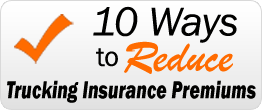While the insurance world can seem complex and intimidating, it’s important to understand how your insurance works to avoid coverage gaps and to obtain the most affordable policy for your trucking operation. In this article, we’ve compiled some of the most common commercial truck insurance myths we’ve encountered.
Myth #1: My motor carrier’s insurance policy provides complete coverage for my operation.
Of all the commercial truck insurance myths we cover in this article, this is one of the most common and potentially one the most damaging. Generally speaking, your motor carrier’s insurance policy ends when you are not under their dispatch. If you’re using your vehicle for a task not delegated to you by your motor carrier, you’ll likely be out of luck in the event of an incident. NTL (non-trucking liability), physical damage, and occupational accident are coverages which should be of interest for owner-operators leased onto another motor carrier.
For more information, check out our article on owner-operator insurance (“Owner-operators leased onto another Motor Carrier” section).
Myth #2: All employees are always covered when they drive my business’s insured vehicle.
In order for this to be true, your policy must include “permissive use,” which covers your drivers as long as you have given them permission to operate the vehicle. “Permissive use” is not always an option because some insurance providers will only provide coverage to drivers who are specifically named.
Myth #3: Since I have insurance, I don’t need to worry about downtime after an accident.
Not all insurance policies are created equal, and many won’t cover the expenses you’re likely to incur during downtime after an accident. To ensure you have comprehensive downtime coverage, look into the Physical Damage section of your commercial truck insurance policy to ensure it includes provisions for Extended Towing, Downtime coverage, truck rental reimbursement, and other emergency expense reimbursements.
For more information, check out our Physical Damage coverage page.
Myth #4: I need a separate cargo insurance policy.
A cargo endorsement can be a less expensive alternative to carrying a separate policy for cargo insurance, and if you’re involved in an accident that damages both your truck and cargo, you’ll only need to file your claim to one company rather than two separate insurance companies.
Check out our article on common cargo insurance gaps.
Myth #5: Insurance premiums are set in stone, and it’s typically impossible to lower them.
While it’s true that insurance premiums are calculated using factors which are not always under your control, there are several options you can explore to lower your insurance costs:
- Having a lower deductible will result in lower up-front costs in the event of an accident, but your insurance premium will rise in turn. If your operation has never or very seldom been involved in accidents, increasing your deductible to $1,000 – $2,500 might be worth looking into.
- Take safety seriously. Company safety programs and driver safety program can help to reduce your insurance premium. Having a clean DOT safety record will also help. Lastly, safety / accountability features such as dash cam systems can help to prevent against fraudulent claims.
- Considering paying for your entire policy upfront instead of through payment plans. Most insurance providers offer a ~5% discount when you pay for the entire policy upfront.
- Request a policy review from your insurance agent. If your business has changed, you may be paying for extra coverages you no longer need — or on the other hand you may have coverage gaps that need to be closed.
For more information about minimizing commercial truck insurance premiums, check out our article 10 Ways to Reduce Trucking Insurance Premiums.
Myth #6: Seasonal businesses should cancel their insurance policy during the off-season.
The major disadvantage of canceling your insurance policy when trucks are out-of-use or in storage is that your trucks will not be covered in the event of vandalism, fire, theft, and so on. As a result, while we typically wouldn’t recommend canceling your insurance policy when your vehicles aren’t in use, Colonial does recommend switching to a comprehensive-only policy for the duration of your business’s downtime. A comprehensive-only policy will cover you from situations like fire and theft but won’t provide unnecessary liability coverage which would only be needed if your vehicles were being driven.
Myth #7: Any insurance company can help with state and federal filings.
Generally speaking, you need to enlist the help of a trucking insurance specialist in order to obtain help with state and federal filings for operations engaging in interstate transportation, hauling hazardous materials, and so on. Some insurance agents won’t be able to cover vehicles which require insurance filings, while others simply won’t have the expertise to help or to provide a comprehensive commercial truck insurance policy.
Myth #8: 24/7 claims filing is the standard in the insurance industry.
Since most trucking operations operate at least partially outside of regular business hours, 24/7 claims service is often a deal-breaker. Before you enlist an insurance provider for coverage, check their availability if 24/7 service is important to you.
Myth #9: All insurance is basically the same, so I should seek out the cheapest option.
Price is often the only consideration for those seeking commercial truck insurance, but we encourage trucking operations to seek out comprehensive coverage first and a low cost second. Obtaining comprehensive coverage usually means dealing with an insurance agency with trucking insurance expertise.



